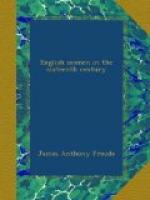to attack the Spaniards in a French port might be
dangerous for many reasons. It was uncertain after
the day of the Barricades whether the Duke of Guise
or Henry of Valois was master of France, and a violation
of the neutrality laws might easily at that moment
bring Guise and France into the field on the Spaniards’
side. It was, no doubt, with some such expectation
that the Duke and his advisers had chosen Calais as
the point at which to bring up. It was now Saturday,
the 7th of August. The Governor of the town came
off in the evening to the
San Martin.
He expressed surprise to see the Spanish fleet in
so exposed a position, but he was profuse in his offers
of service. Anything which the Duke required
should be provided, especially every facility for
communicating with Dunkirk and Parma. The Duke
thanked him, said that he supposed Parma to be already
embarked with his troops, ready for the passage, and
that his own stay in the roads would be but brief.
On Monday morning at latest he expected that the attempt
to cross would be made. The Governor took his
leave, and the Duke, relieved from his anxieties,
was left to a peaceful night. He was disturbed
on the Sunday morning by an express from Parma informing
him that, so far from being embarked, the army could
not be ready for a fortnight. The barges were
not in condition for sea. The troops were in
camp. The arms and stores were on the quays at
Dunkirk. As for the fly-boats and ammunition
which the Duke had asked for, he had none to spare.
He had himself looked to be supplied from the Armada.
He promised to use his best expedition, but the Duke,
meanwhile, must see to the safety of the fleet.
Unwelcome news to a harassed landsman thrust into
the position of an admiral and eager to be rid of
his responsibilities. If by evil fortune the
north-wester should come down upon him, with the shoals
and sandbanks close under his lee, he would be in
a bad way. Nor was the view behind him calculated
for comfort. There lay the enemy almost within
gunshot, who, though scarcely more than half his numbers,
had hunted him like a pack of bloodhounds, and, worse
than all, in double strength; for the Thames squadron—three
Queen’s ships and thirty London adventurers—under
Lord H. Seymour and Sir John Hawkins, had crossed in
the night. There they were between him and Cape
Grisnez, and the reinforcement meant plainly enough
that mischief was in the wind.
After a week so trying the Spanish crews would have
been glad of a Sunday’s rest if they could have
had it; but the rough handling which they had gone
through had thrown everything into disorder. The
sick and wounded had to be cared for, torn rigging
looked to, splintered timbers mended, decks scoured,
and guns and arms cleaned up and put to rights.
And so it was that no rest could be allowed; so much
had to be done, and so busy was everyone, that the
usual rations were not served out and the Sunday was
kept as a fast. In the afternoon the stewards




